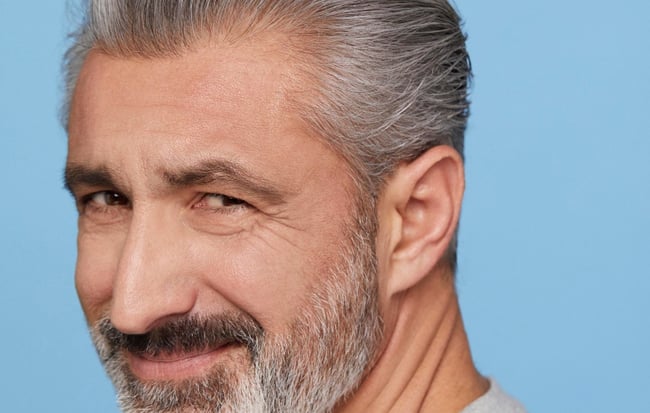

How I Prevent and Treat Stress-Induced Skin Irritation
Photos D.R
Words Anthony Vincent
Share the article on
As he gets older, Claude is increasingly starting to notice the effects of stress on his skin. Pimples, redness, dryness, and rashes can make life a bit more difficult than it used to be. Today, he shares what’s been working for him in his fight against skin stress.
"With age, I thought I would only have to worry about wrinkles, but it seems my skin is also becoming more sensitive, reactive, and irritable," says Claude, 54. This logistics manager in the construction industry grew up in the South of France, where he didn't particularly take care to protect himself from the sun: "I thought sunscreen was something for people who couldn't tan, which wasn't my case. I could tan easily, so I took advantage of it because it made me look healthy. But today, I'm paying the price because I feel like it contributed to weakening my skin. I really feel the effects after each summer, and even from the first rays of spring."
Sun overexposure makes the skin more reactive to stress and more easily irritated
The phrase "sun capital" might not be familiar to you. But remember it! It’s not like a counter like you see in video games that can be used and recharged. The CNRS (National Center for Scientific Research) defines it as "the sum of the skin's defense mechanisms against the harmful effects of the sun. This capital is acquired at birth, non-renewable, and depends on the phototype of each individual. Each skin type has characteristics and a type of reaction to aggressions, notably those from the sun." In short, it’s the amount of UV light that the skin can tolerate before it becomes damaged. So, even though he still tans easily, Claude is seeing that this comes with dryness and irritation. This is amplified by the fact that he shaves almost every day, and worsened by stress.
Stress can cause dryness, redness, and rashes
"When I was younger, I could handle a lot of alcohol, cheese, chocolate, insomnia, and stress before it showed on my skin, mostly as spots. Today, my tolerance is much lower. In addition to potential spots, stress alone is enough to cause areas of dryness, as well as uncomfortable redness, usually around the edges of my nose." But the worst appearance of stress on his skin appears on his body: "When big challenges or deadlines approach, I get reddish hives in different places. Generally on my neck, the insides of my wrists and elbows, or behind my knees. It looks quite like eczema, actually."
Make a change based on lifestyle rather than just treating the symptoms
Unsurprisingly, his dermatologist has identified stress as a very likely triggering factor of his sudden skin eruptions: "She recommended avoiding cosmetics based on essential oils, which can be irritating, and overly hot showers that alter and weaken the skin barrier. I thought it would be treated with cortisone-based medicine-creams. But my dermatologist rather presented them as a last-resort option, advising me to act more on stress management. However, I'm not really a fan of yoga, meditation, and all that stuff. During lockdown, I was suddenly deprived of my favorite ways to unwind like cinema, theater, and drinks with friends. I hadn't made the connection with my skin irritations, but it's true that it didn’t help! Wearing a mask also increased the irritations around the edges of my nose and on the tops of my cheeks."
Claude's best anti-stress remedies
To fight against the stress and the skin irritations it causes him, Claude has started a few simple well-being techniques: "Maybe it's my professional training, but I tend to want to optimize everything. So in times of stress, I try even more to do one thing at a time, and make an effort to perform activities that give me pleasure mindfully, like cooking for example. When I'm working from home half the week, I force myself to take a full hour lunch break, away from screens. I also asked my doctor for a certificate to go swimming at the pool, which really helps me to relax. And once a week, I walk in the park near my home for an hour while I’m on the phone with someone from my family. Having a catch-up while doing physical activity in contact with nature. It may not seem like much, but I really feel like it helps me be less stressed. And therefore I’m feeling better in my skin!"